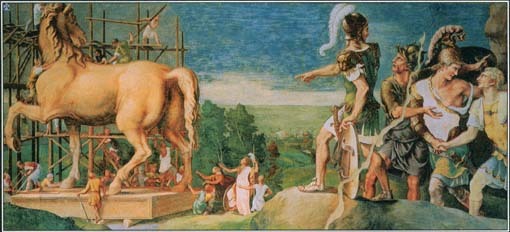Trojan War
In Greek mythology, the Trojan War was a legendary ten-year conflict in which Greek warriors laid siege to Troy, a city on the northwestern coast of Asia Minor*. Homer's* great epic the Iliad describes the activities of gods, goddesses, and human heroes during the final year of the war. Some scholars think that the story of the Trojan War may have been based on memories of distant historical events, which became myths with the passage of time.
According to these myths, the Trojan War was rooted in vanity and passion. A youth named Paris, one of the sons of King Priam of Troy, was asked to choose the fairest of three goddesses: Aphrodite*, Athena*, and Hera*. Each goddess offered Paris a special gift if he declared her the fairest. Paris selected Aphrodite, who had promised him the most beautiful woman in the world.
Aphrodite led Paris to Sparta, the home of a Greek prince named Menelaus. Helen, the wife of Menelaus, was considered the world's most beautiful woman. Paris fell in love with Helen and carried her off to Troy. Menelaus asked his brother King Agamemnon* to lead the princes and warriors of Greece against Troy to recover Helen and to punish the Trojans.
siege attempt to conquer a city or fortress by surrounding it with troops and cutting off supplies
epic long poem about legendary or historical heroes, written in a grand style
After some delays, the Greeks arrived outside Troy. They besieged the city but made little progress in the war for more than nine years. The Iliad takes up the story just when Agamemnon
*See Names and Places at the end of this volume for further information.

insulted Achilles*, his bravest warrior. Furious with Agamemnon, Achilles withdrew from the conflict and cursed his Greek comrades.
Meanwhile, Hector, another of Priam's sons and the leading Trojan warrior, led a force out of the besieged city to attack the Greeks. He killed Patroclus, who had borrowed the armor of his friend Achilles. Filled with grief and rage, Achilles returned to the battle and slew Hector. Then he dragged Hector's body behind his chariot, preventing the Trojans from holding a proper funeral. This dishonorable act angered the gods, who persuaded Achilles to return the body to Hector's family.
Paris killed Achilles with a well-aimed arrow, only to be killed in turn by a Greek archer. After the death of Achilles, the Greeks recognized Odysseus* as their finest warrior. The valiant Ajax, angry at being passed by, attempted to kill the other Greek leaders and finally committed suicide. Meanwhile, the clever Odysseus came up with a plan to defeat Troy by trickery rather than direct force. He instructed the Greeks to build an enormous, hollow wooden horse on wheels. Greek soldiers hid inside the horse, which was then wheeled to the gates of Troy. The Trojans awoke to find this marvel outside their gates and brought it into the city. That night the Greek soldiers climbed out of the horse and opened the city gates to admit more Greeks. Then they set Troy afire, killing Priam and his family. The term Trojan horse is used to this day to refer to something that appears to be a harmless gift but carries unsuspected danger or destruction within.
medieval relating to the Middle Ages in Europe, a period from about A.D. 500 to 1500
The Trojan War also provided mythological material for the Romans, who traced their ancestry to Aeneas, a Trojan nobleman who escaped the destruction of Troy. Medieval Europeans created new poems and legends about the Trojan War, often presenting the Trojan point of view. A British legend, for example, claimed that Britain had been founded by descendants of Aeneas and the last Trojans.
See also Achilles ; Aeneas ; Agamemnon ; Ajax ; Greek Mythology ; Hector ; Helen of Troy ; Homer ; Iliad, The ; Odysseus ; Paris ; Priam .
i like how yu put lots of detail in your writtings